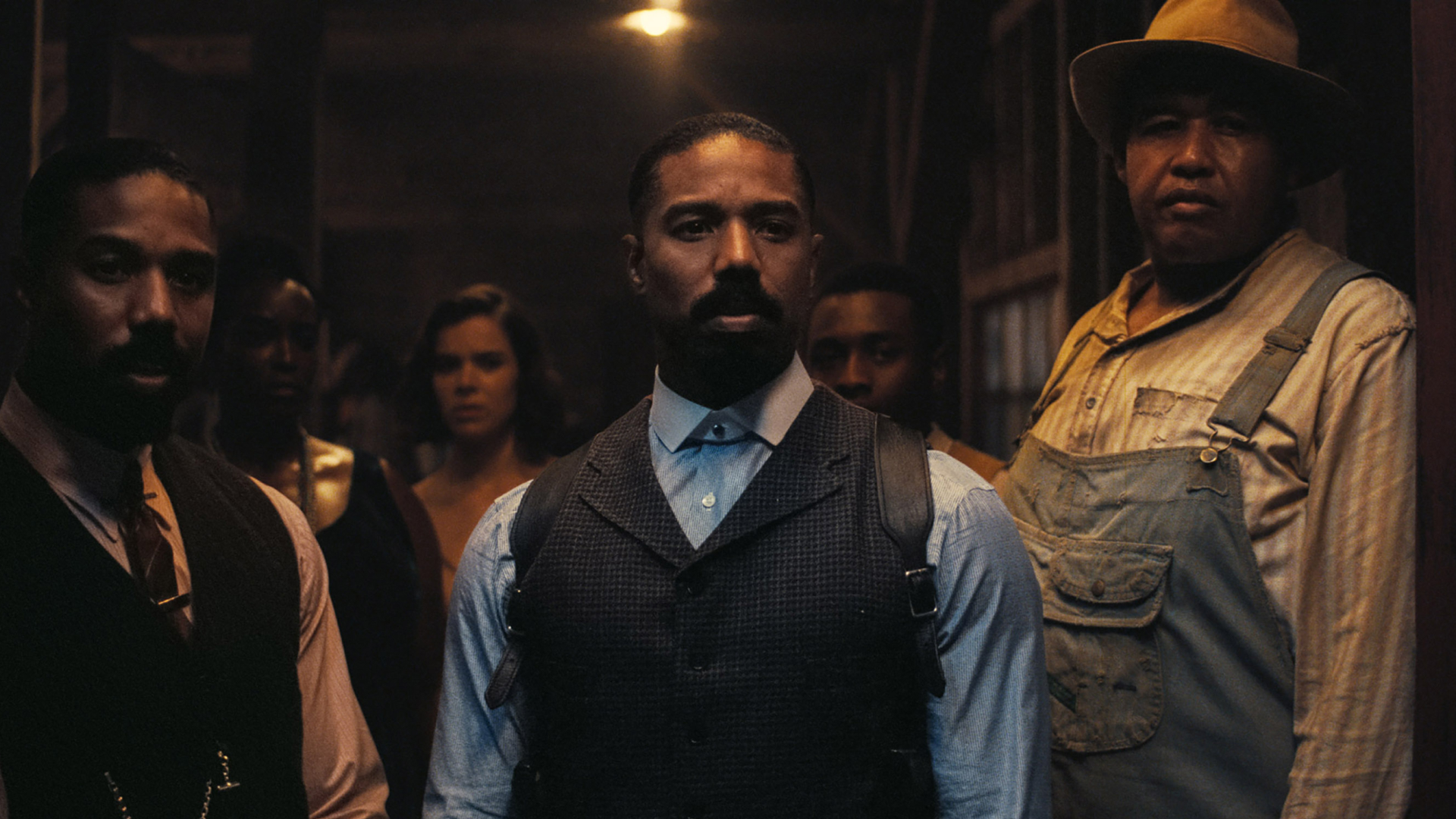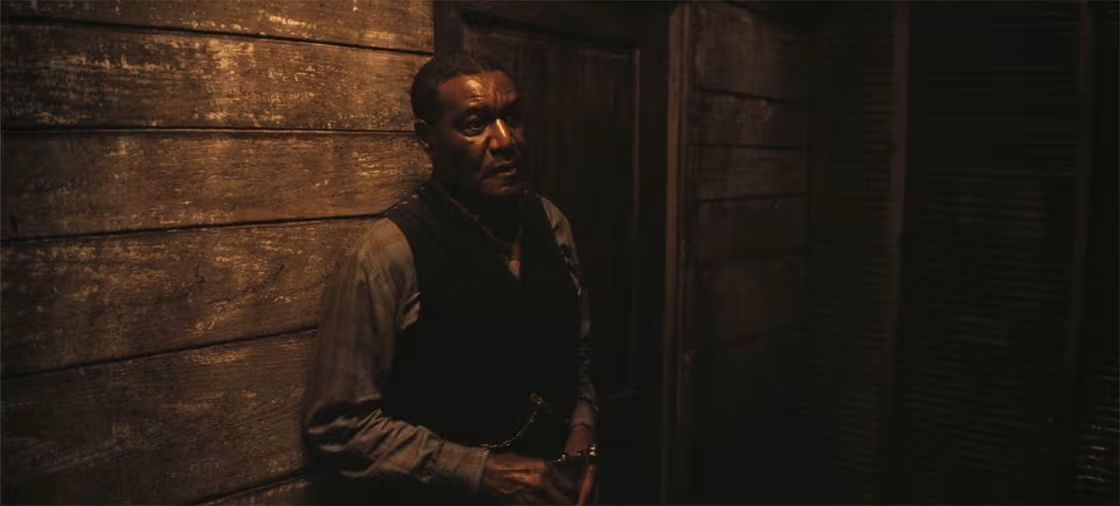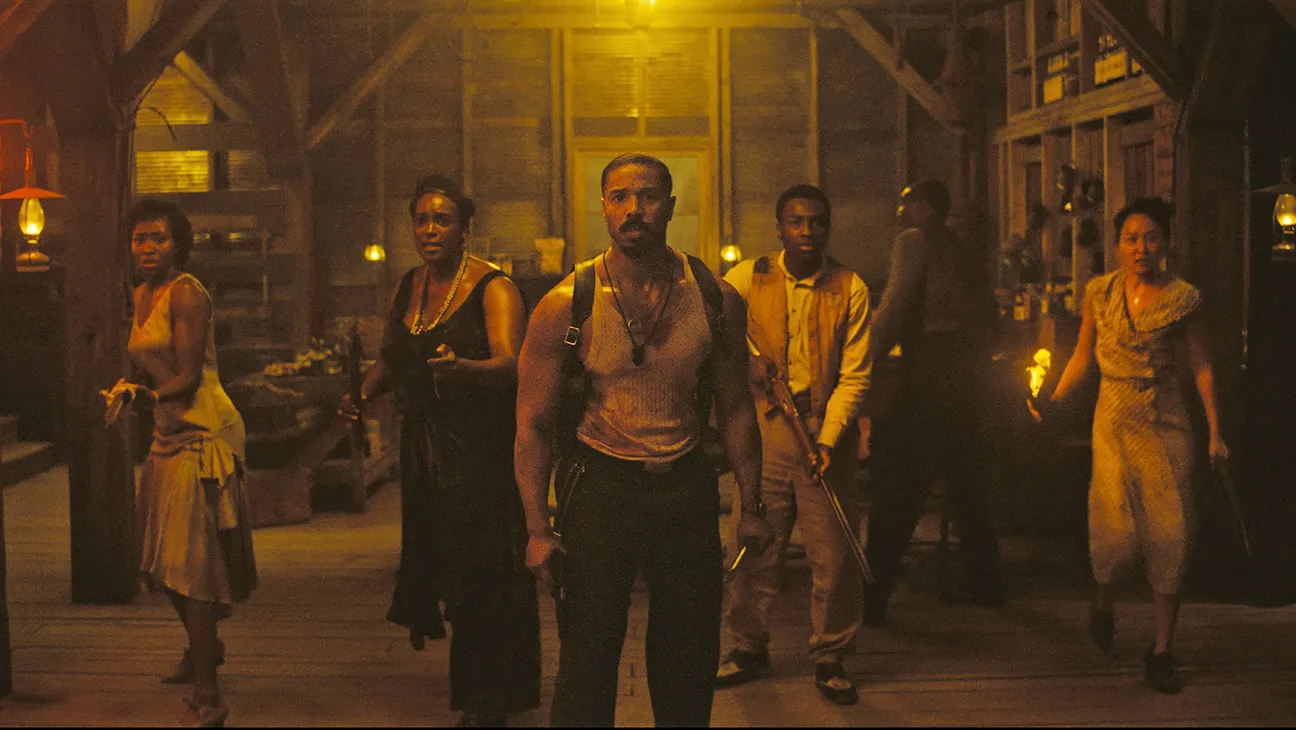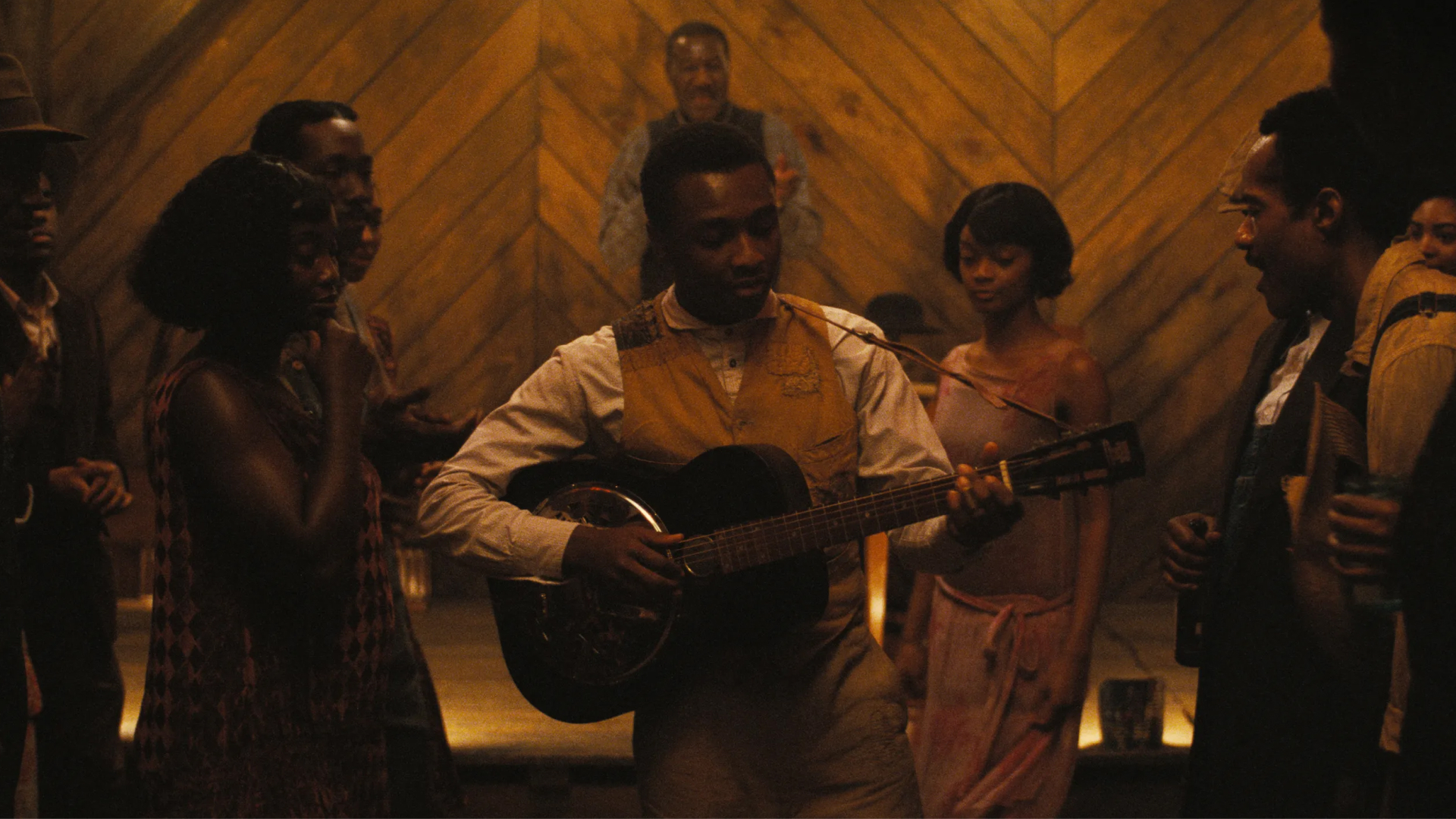This story contains extensive spoilers for Sinners. Ryan Coogler’s vampire-blues epic Sinners centers on an eventful 24 hours in 1932 Clarksdale, Mississippi, as gangster twins Smoke and Stack (both played by Michael B. Jordan) host the opening night of their juke joint. The horror film‘s lore—borrowed from folktales across ancient cultures—suggests that some musicians are imbued with the power to blur the line between life and death, like Miles Canton’s character, the twins’s cousin Sammie “Preacher Boy” Moore. With one powerful blues performance at the club, he summons the spirits of Black music past and present.
Sammie’s performance is a summation of Sinners’ love letter to Black music and its influence on every modern genre, paired with the film’s overall adulation of Black Southern history and culture. However, the most compelling moment that shows the true emotional power of Sammie’s music, and all great music, doesn’t take place at the juke. The most poignant music scene (and my favorite of the film) is when another Sinners character demonstrates music’s universal power to connect the past and present.

The Sinners cast, from left: Stack (Michael B. Jordan), Annie (Wunmi Mosaku), Mary (Hailee Steinfeld), Smoke (Jordan), Sammie (Miles Caton), and Cornbread (Omar Benson Miller).
(Image credit: Courtesy of Warner Bros. Pictures)
The first half of Sinners follows the SmokeStack twins as they separately gather the people they need to run their juke, from the Chinese Delta grocers Grace (Li Jun Li) and Bo (Yao) to Smoke’s old flame, hoodoo practitioner Annie (Wunmi Mosaku). To provide music along with Sammie, Stack recruits Delta Slim (film legend Delroy Lindo), a local musician who loves drinking just as much as he loves the blues. As Stack, Sammie, and Slim drive past acres of cotton fields, they pass a chain gang singing as they work on the roadside. Slim, who knew the prisoners, recalls when he and his old musical partner were arrested on a trumped-up charge and forced to perform at a white mansion party without pay. His partner was subsequently falsely accused of rape and murdered. As Slim tells the story, the sounds of a lynching seep into the score. As we hear the sound of a rope stretching, the bluesman, overcome with emotion, begins to hum his sorrow, and then sings. Stack tells Sammie to start playing his guitar.
It’s a scene more effective than the many allegories presented in the Black horror boom of recent years, following the release of Get Out in 2017. Coogler shows the vital essence of the blues, a genre created in the late 19th century by Black musicians living under the horrors and indignities of Jim Crow, just a generation out of slavery. In one moment, Slim’s music helps him acknowledge and process the past before transforming his painful memories into something beautiful—something that the younger generation, like Sammie joining in on his guitar, can build upon.

Delta Slim (Delroy Lindo) is among the longtime blues musicians in Sinners.
(Image credit: Warner Bros. Pictures)
In the aforementioned scene of Sammie’s set at the juke joint, he does build upon this. Though Slim briefly mentions having dealt with some devils in his lifetime of playing the blues, Sammie appears to be the only descendant of griots and spiritual storytellers whose magic we see in Sinners. While playing a rendition of “I Lied to You,” the film relays a chronicle of Black music history, threading African tribal drummers, a Jimi Hendrix-style rock guitarist, and a classic hip-hop DJ to that moment. The scene draws the most undeniable line from African culture that endured through the Transatlantic slave trade to the blues, rock, soul, hip-hop, and beyond, ever put on film. It’s a bold statement in an era where the political powers that be are literally erasing Black history from federal records.
Of course, this is only half of the film’s musical themes. Sammie’s griot power also lures out evil in the form of Remmick (Jack O’Connell), a Celtic vampire who sets his sights on the blues singer. When he approaches the revelers, Remmick offers elevation above racial prejudice and superhuman power in exchange for vampiric assimilation, with the film making a clear allusion to the history of Black music being stolen and appropriated into mainstream (white) culture. But Remmick’s true motivation isn’t as stark. As Annie explains, the vampiric curse in Sinners traps the afflicted human’s soul inside their body with the demon spirit, so while their personality and memories are retained, their soul cannot ascend and join their loved ones in the afterlife. Remmick wants to claim Sammie because the bluesman will allow the vampire to connect to the loved ones he outlived centuries ago.

Survivors Pearline (Jayme Lawson), Annie (Wunmi Mosaku), Smoke (Michael B. Jordan), Sammie (Miles Caton), Slim (Delroy Lindo), and Grace (Li Jun Li) prepare for the final stand-off with the vampires.
(Image credit: Courtesy of Warner Bros. Pictures)
Since Sinners’ debuted in theaters on April 18, 2025—breaking box office records in its opening weekend—Remmick has quickly been lauded as one of Coogler’s signature morally-complex antagonists, as enticing and charismatic as he is deadly. Through Remmick, Coogler plays with the allure of the modern vampire, a monster that evoked seduction long before they could be depicted as unequivocally hot. As the night goes on, Remmick and his two fledglings bite and turn several of the Delta residents, even including Stack and his ex-lover Mary (Hailee Steinfeld). The central battle turns from us vs. them to brother vs. brother, as an undead Stack implores Smoke to join them in eternal glory and power. (Who among us who have dipped their toe into the worlds of Twilight or Interview with a Vampire fandom has not weighed the pros of vampirism with the cons?)
Still, despite the respect with which Coogler treats both the vampire and the Irish musical tradition, Sinners masterfully shows why Sammie being turned into a creature of the night would be the ultimate tragedy. The true danger of the vampire is being cut off from the past, stuck in the present day without any connection to your lineage or legacy. As a vampire, you may be powerful, but you’re also lost, desperate for connection and filled with existential yearning. Remmick is no exception; his life, as we see it, is his quest to find any meaningful connection to his past, however tenuous or brief. Sammie is important because, without him, Remmick cannot mend these severed ties. What an important gift music is, one passed on from Slim’s generation to Sammie’s, that even an eternal being recognizes its value.

Smoke (Michael B. Jordan) and Sammie (Miles Caton) in the film’s dramatic conclusion.
(Image credit: Warner Bros.)
During his press run, Coogler has been open about Sinners being a film where he “interrogates [his] own personal heritage.” The movie is inspired by his late uncle, a Mississippi man who “communicated” through Blues music. Sammie’s power is a fantasized depiction of how Black musicians channelled the past and influenced the future of culture through their craft, but communicating through music is also a daily practice for humans. Music helps the brain create complex memories. Different harmonic progressions can evoke specific moods and emotions. And very importantly for these times, music has also been a historical record, reflecting both wide cultural shifts and global events, as well as the day-to-day lives of our forebearers. Even today, some of the industry’s most exciting artists—Beyoncé, Kendrick Lamar, Doechii, and more—study music history and honor legendary artists while moving the genre forward. They’re the Sammies, picking up Slim’s harmony and building upon it. In its most pivotal music moments, Sinners shows how music connects us to the past, how it can help us get through the present, through cultural memory and catharsis, and how that inherent soul will always be more powerful than whatever the vultures try to take from us.

